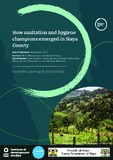How Sanitation and Hygiene Champions Emerged in Siaya County
| dc.contributor.author | Meeuwissen, Talia | |
| dc.contributor.author | Chanzu, Mable | |
| dc.contributor.author | Aubriot, Julie | |
| dc.contributor.author | Kariuki, Jimmy | |
| dc.contributor.author | Odhiambo, Carolyne | |
| dc.contributor.author | Okumu, Hillary | |
| dc.contributor.author | Karichu, Peter | |
| dc.contributor.author | Mwende, Emmah | |
| dc.coverage.spatial | Kenya | en |
| dc.date.accessioned | 2021-10-01T08:27:48Z | |
| dc.date.available | 2021-10-01T08:27:48Z | |
| dc.date.issued | 2021-09 | |
| dc.identifier.citation | Meeuwissen, T. and Chanzu M. with Aubriot, J.; Karichu, P.; Kariuki, J.; Odhiambo, C.; Okumu, H. and Mwende, E. (2021) How Sanitation and Hygiene Champions Emerged in Siaya County, A Sanitation Learning Hub Case Study. The Sanitation Learning Hub, Brighton: IDS, DOI: 10.19088/SLH.2021.019 | en |
| dc.identifier.isbn | 978-1-78118-845-3 | |
| dc.identifier.uri | https://opendocs.ids.ac.uk/opendocs/handle/20.500.12413/16861 | |
| dc.description | This is the case study developed by Siaya County and UNICEF documenting their experiences and reflections from working together to increase prioritisation of S&H in Siaya County, Kenya. | en |
| dc.description.abstract | This case study was developed to inform subsequent research and analysis of local government leadership and prioritisation of sanitation and hygiene (S&H) in East Africa. Consolidated learning from across the three countries involved can be found in the Sanitation Learning Hub (SLH) Learning Brief: Strengthening sub-national systems for area-wide sanitation and hygiene. From late 2020 to early 2021, the SLH collaborated with local government actors and development partners from three sub-national areas to explore ways of increasing local government leadership and prioritisation of S&H to drive progress towards area-wide S&H. For some time, local government leadership has been recognised as key to ensuring sustainability and scale and it is an important component of the emerging use of systems strengthening approaches in the sanitation sector. It is hoped that this work will provide practical experiences to contribute to this thinking. Three case studies were developed to capture local government and development partners’ experiences supporting sub-national governments increase their leadership and prioritisation of S&H in Siaya County (Kenya), Nyamagabe District (Rwanda), and Moyo District (Uganda), all of which have seen progress in recent years. The development partners involved were UNICEF in Kenya, WaterAid in Rwanda, and WSSCC/Uganda Sanitation Fund in Uganda. The cases were then analysed through three online workshops facilitated with staff from the local governments, central government ministries and development partners involved to explore them in further detail, review experiences and identify levers and blockages to change. Lessons from the workshops are documented in the SLH learning brief mentioned above. This is the case study developed by Siaya County and UNICEF documenting their experiences and reflections from working together to increase prioritisation of S&H in Siaya County, Kenya. | en |
| dc.description.sponsorship | Sida | en |
| dc.description.sponsorship | Unicef | en |
| dc.description.sponsorship | WSSCC | en |
| dc.language.iso | en | en |
| dc.publisher | Institute of Development Studies | en |
| dc.relation.ispartofseries | Sanitation Learning Hub Case Study;Siaya County, Kenya | |
| dc.rights | This series is licensed under the Creative Commons Attribution-Non-Commercial-NoDerivs 3.0 Unported License (http://creativecommons.org/licenses/by-ncnd/3.0/). Attribution: You must attribute the work in the manner specified by the author or licensor. Non-commercial: You may not use this work for commercial purposes No Derivative Works: You may not alter, transfer, or build on this work Users are welcome to copy, distribute, display, translate or perform this work without written permission. For any reuse or distribution, you must make clear to others the licence terms of this work. If you use the work, we ask that you reference the SLH website and send a copy of the work or a link to its use online to the following address: Sanitation Learning Hub, Institute of Development Studies, University of Sussex, Brighton, BN1 9RE, UK (SLH@ids.ac.uk). | en |
| dc.rights.uri | http://creativecommons.org/licenses/by-nc-nd/3.0/ | en |
| dc.subject | Health | en |
| dc.subject | Participation | en |
| dc.subject | Poverty | en |
| dc.subject | Rural Development | en |
| dc.subject | Water | en |
| dc.title | How Sanitation and Hygiene Champions Emerged in Siaya County | en |
| dc.type | Series paper (IDS) | en |
| dc.rights.holder | Sanitation Learning Hub, Institute of Development Studies | en |
| dc.identifier.team | Participation | en |
| dc.identifier.doi | 10.19088/SLH.2021.019 | |
| dcterms.dateAccepted | 2021-09 | |
| rioxxterms.funder | Default funder | en |
| rioxxterms.identifier.project | The Sanitation Learning Hub | en |
| rioxxterms.version | VoR | en |
| rioxxterms.versionofrecord | 10.19088/SLH.2021.019 | en |
| rioxxterms.funder.project | 44cbea9c-3179-456c-bc3f-9b7cd4f89d0d | en |
Files in this item
This item appears in the following Collection(s)
Except where otherwise noted, this item's license is described as This series is licensed under the Creative Commons Attribution-Non-Commercial-NoDerivs 3.0 Unported License (http://creativecommons.org/licenses/by-ncnd/3.0/).
Attribution: You must attribute the work in the manner specified by the author or licensor.
Non-commercial: You may not use this work for commercial purposes No Derivative Works: You may not alter, transfer, or build on this work
Users are welcome to copy, distribute, display, translate or perform this work without written permission. For any reuse or distribution, you must make clear to others the licence terms of this work. If you use the work, we ask that you reference the SLH website and send a copy of the work or a link to its use online to the following address: Sanitation Learning Hub, Institute of Development Studies, University of Sussex, Brighton, BN1 9RE, UK (SLH@ids.ac.uk).


